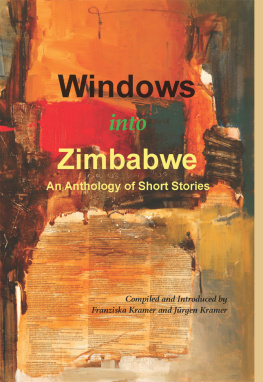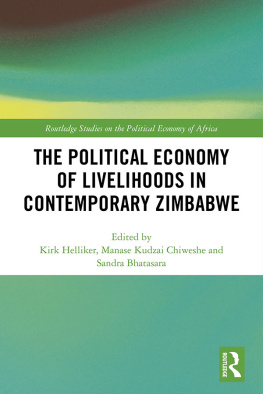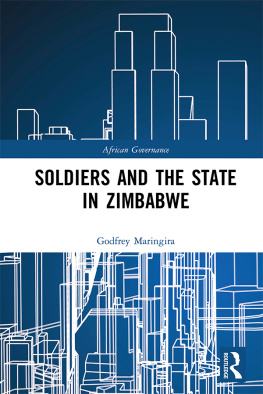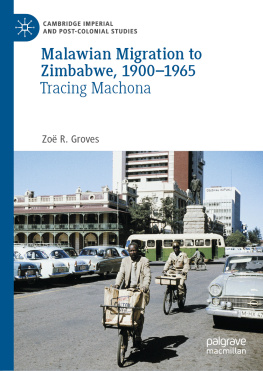Published by Weaver Press,
Box A1922, Avondale, Harare. 2021
Each individual chapter the author. This collection
Weaver Press 2021
Typeset by Weaver Press
Cover Design: Danes Design
The publishers would like to express their gratitude to the CEADZ Consortium for their support in the publication of this book.
All rights reserved. No part of the publication may be reproduced, stored in a retrieval system or transmitted in any form by any means electronic, mechanical, photocopying, recording, or otherwise without the express written permission of the publisher.
ISBN: 978-1-77922-400-2 (p/b)
ISBN: 978-1-77922-401-9 (ePub)
ISBN: 978-1-77922-402-6 (PDF)
Michael Bourdillon went to school at St Georges College, Harare, and subsequently studied Social Anthropology at the University of Oxford. He taught for 25 years in the Department of Sociology, University of Zimbabwe. He has also taught in the University of Calabar, Nigeria, and has directed the Child and Youth Institute in Dakar at the Council for the Development of Social Science Research in Africa. He has been practically involved in interventions for street children and for working children, and has continued to research and publish widely in the field of childhood studies, especially on childrens work and on children in poverty.
Eve Musvosvi Chandaengerwa is a lecturer in Sociology at Midlands State University. After graduating in sociology at the University of Zimbabwe, she was awarded an MSc at UZ and a PhD at the University of Pretoria. Her research interests include youth and child rights, socio-cultural anthropology, and the anthropology of health and illness. She has published widely, and is actively engaged in a range of community-based activities.
Simbarashe Gukurume is a Senior Lecturer at Sol Plaatje University in the Department of Social Sciences. Prior to that he was a lecturer and faculty research chairperson at Great Zimbabwe University. Simbarashe holds a PhD from the University of Cape Town. His Masters in Sociology and Social Anthropology and BSc in Sociology were obtained from the University of Zimbabwe. His research focuses broadly on the sociology of youth, informality and informal economies, livelihoods, displacements, the ethnography of money, politics and social movements and Pentecostalism. Simbarashe has been a recipient of the Harry Frank Guggenheim Young African Scholars, and the Matasa Fellows Network awards.
Eric Kushinga Makombe is a Senior Lecturer in the Department of History, Heritage and Knowledge Systems at the University of Zimbabwe and a Research Fellow in the History Department at the University of the Free State. He holds a PhD in History from the University of the Witwatersrand. His broad research interests are in urban history, human economy and livelihoods, rural-urban linkages, and rural development. His articles have appeared in Global Environment and Essays in Economic & Business History.
Felix Maringe is a Professor of Higher Education and former Head of the Wits School of Education. He researches international education and leadership in circumstances of multiple deprivation in different educational settings. His key contribution in this field is the Poverty, Antecedents, Curriculum and Teaching and Learning (PACT) model developed as both an analytic and evaluative model for interrogating the challenges of leading educational institutions in circumstances of multiple deprivation.
Alfred Masinire is Senior Lecturer and Head of the Curriculum Division in the School of Education at the University of the Witwatersrand. His research focuses on rural education, as well as gender and teacher development in rural schools. At the core of his work, he maintains a strong commitment to rurality and social justice. His most recent publications are Rurality, Social Justice and Education in Sub-Saharan Africa Volume I: Theory and (with Amasa P. Ndofirepi) Practice in Schools and Rurality, Social Justice and Education in Sub-Saharan Africa Volume II: Theory and Practice in Higher Education.
Rekopantswe Mate is a Senior Lecturer in the Sociology Department, University of Zimbabwe, where she teaches development studies, youth studies and popular culture. She does research on social change and how it affects generational and gender relations. Her publications include journal articles, book chapters and encyclopaedia entries on young people and women in Zimbabwe.
Ivo Mhike is a postdoctoral fellow with the International Studies Group at the University of the Free State. His PhD thesis focused on the state constructs of childhood and deviance in colonial Zimbabwe. His research interests include youth cultures in the colonial and post-colonial state, economic change and the transformation of the family unit. He is working on a monograph entitled Degeneracy and Empire: Childhood, Youth and Whiteness in Colonial Zimbabwe, 1900-c.1960 for the Palgrave Studies in the History of Childhood. Ivo has also taught at the University of Zimbabwe in the Economic History Department.
Rangirai Gavin Muchetu is a political economist who specialises in rural and agricultural development. He obtained his PhD in Global Society Studies from Doshisha University, Kyoto, and is currently studying farmer cooperatives in Shiga Prefecture, Japan, as a postdoctoral fellow. His thesis focused on issues faced by agrarian societies after Japanese and Zimbabwean radical land reforms. His interest is in the forms and character of the collective-action mechanisms utilised to combat post-reform market contradictions. As the realities of unavoidable land reforms settle in southern Africa, it becomes vital to explore such debates to proffer lasting solutions.
Ngonidzashe Muwonwa is an academic and multi-media producer interested in youth identities and popular culture. His youth-centric research utilises participatory methods which resonate with young peoples embedded attitudes, desires and practices which normally challenge and subvert adult-constructed normative ideologies of youth. He strongly believes that young people in Zimbabwe and the rest of Africa are precariously perched at the intersection of tradition and modernity, and therefore a non-prohibitive framework of understanding what it means to be a young adult needs to be incorporated in all youth studies to appreciate youth agency and competencies while reducing their vulnerabilities.
Marjoke Oosterom is a research fellow at the Institute of Development Studies, University of Sussex. She has a background in comparative politics and her research concentrates on the effects of violence, conflict and repression on civic and political participation; civic space; and popular and collective action. Her specific expertise is in youth politics; political socialization; the politics of the informal economy; and youth employment and empowerment in fragile and conflict affected settings. Her research is concentrated on Zimbabwe and Kenya. Marjoke leads the IDS Research Strategy on Youth Employment and Politics, which encompasses a diverse portfolio of interdisciplinary research projects. She regularly advises donors, policy actors and international organisations that fund and implement governance and youth-focused interventions in Sub-Saharan Africa.








